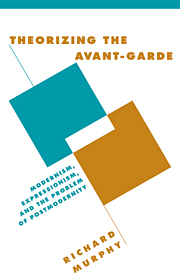Book contents
- Frontmatter
- Contents
- 1 Theories of the avant-garde
- 2 Re-writing the discursive world: revolution and the expressionist avant-garde
- 3 Counter-discourses of the avant-garde: Jameson, Bakhtin and the problem of realism
- 4 The poetics of hysteria: expressionist drama and the melodramatic imagination
- 5 Kafka's photograph of the imaginary. Dialogical interplay between realism and the fantastic. (The Metamorphosis)
- 6 Weimar silent film and expressionism: representational instability and oppositional discourse in The Cabinet of Dr. Caligari
- 7 Conclusion. Postmodernism and the avant-garde
- Bibliography
- Index
7 - Conclusion. Postmodernism and the avant-garde
Published online by Cambridge University Press: 22 September 2009
- Frontmatter
- Contents
- 1 Theories of the avant-garde
- 2 Re-writing the discursive world: revolution and the expressionist avant-garde
- 3 Counter-discourses of the avant-garde: Jameson, Bakhtin and the problem of realism
- 4 The poetics of hysteria: expressionist drama and the melodramatic imagination
- 5 Kafka's photograph of the imaginary. Dialogical interplay between realism and the fantastic. (The Metamorphosis)
- 6 Weimar silent film and expressionism: representational instability and oppositional discourse in The Cabinet of Dr. Caligari
- 7 Conclusion. Postmodernism and the avant-garde
- Bibliography
- Index
Summary
Towards a poetics of postmodernism: simulation, parody, and history
I want to conclude by outlining some of the links between postmodernism and the expressionist avant-garde, and by discussing some of the central issues defining the various cultural formations of the modern and the postmodern period.
The modernist movement is characterized by its all-encompassing fascination with innovation and “the shock of the new.” As Habermas has noted in a key essay in the debate on postmodernism, “Modernity – An Incomplete Project,” from the time of the dispute between the “Ancients and Moderns” the term “modern” has regularly expressed “the consciousness of an epoch that relates itself to the past of antiquity, in order to view itself as the result of a transition from the old to the new.” Modernism similarly constitutes itself primarily in relation to the tradition it simultaneously shrugs off, that is by making “an abstract opposition between tradition and the present.” Consequently, it defines itself by negating a past seen as extending up to all but the “dernier cri.” For the “distinguishing mark of such modern works is ‘the new’ which will be overcome and made obsolete through the novelty of the next style” (4). Paradoxically it is this sense of being authentically “modern” and independent of the past that now articulates the work's claim to belong to the “classics.”
- Type
- Chapter
- Information
- Theorizing the Avant-GardeModernism, Expressionism, and the Problem of Postmodernity, pp. 251 - 299Publisher: Cambridge University PressPrint publication year: 1999



